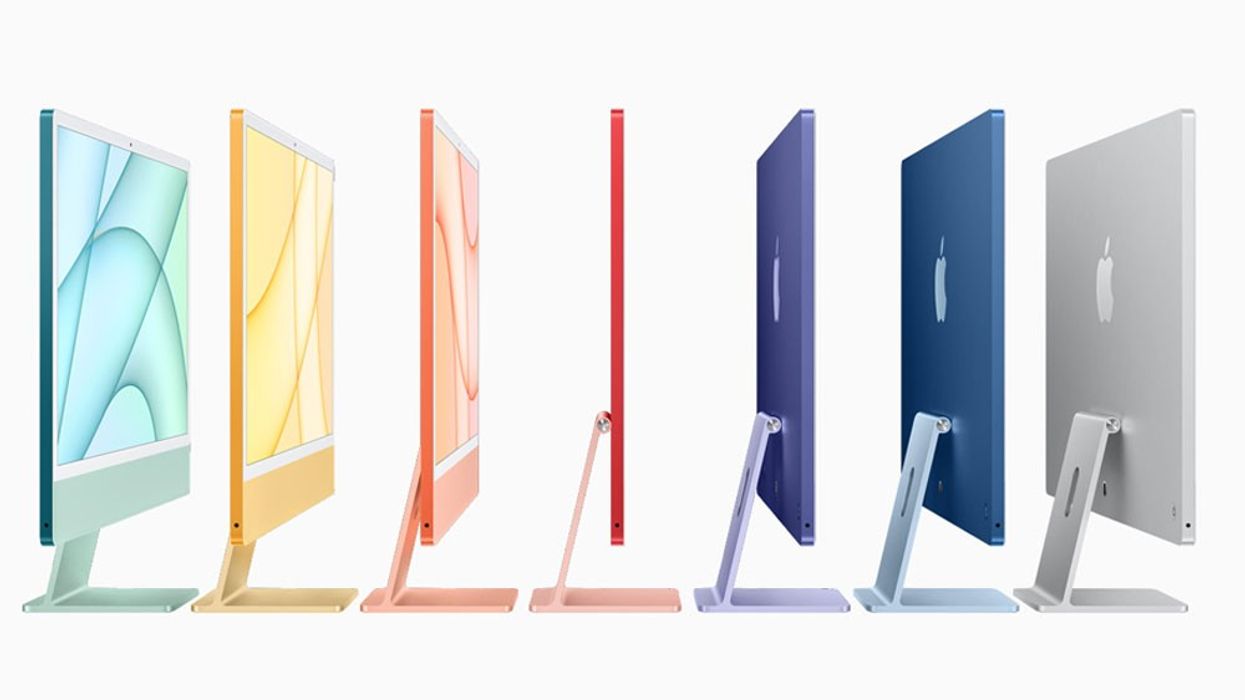M1 Comes to Apple's New iMac, Plus 5.4K Retina Screen, Slim Design
Apple's 4/20 event was high on new tech.

As expected, the latest Apple iMacs tout the new M1 chip, giving it up to 85% faster performance with the 8-core CPU, allowing filmmakers to edit up to four streams of 4K footage, or a single stream of 8K footage in Final Cut Pro. Creatives should also expect 2x faster GPU performance when using apps like Affinity Photo and Photoshop over the 21.5" iMac, which is going to speed up even the smallest of tasks.
The all-new design of iMac is seriously slim. It has a 24" 4.5K retina display with 11.3 million pixels, 500 nits of brightness that takes up 50% less space than the previous 27"/21.5" models, which is bananas in terms of footprint. You may be able to pack this into a carry-on.
The heart of it all is the M1 chip, which is going to boost performance with any software that has built-in native support. During our review of the 13" MacBook Pro, even programs that used Rosetta 2 saw a bump in performance. With the new iMacs, we expect even better performance, reducing export times and lag when cutting high-resolution footage. If it's capable of handling 10-bit color grades well, there may not even be a need to create proxies for smaller projects.

The 24" iMac is available in 8-core GPU or 7-core GPU. Both feature an 8-core CPU, 8GB of unified memory, 256GB SSD, and two Thunderbolt ports, and are available in a variety of colors. The 8-core GPU iMac adds two additional USB-C ports and also features a 1Gbps Ethernet port in the power adapter.
The base price for the 7-core is $1,299 and the 8-core is $1,499.
Apple TV

Apple also announced a new version of Apple TV 4K, which now has an A12 processor built-in supporting HDR and Dolby Vision up to 60fps. The new hardware also comes with a revamped Siri remote that will make it easier to navigate through the variety of app interfaces.
Unique to Apple TV 4K is the ability to adjust the color balance of your TV with an iPhone. Apple TV will use the light sensor in the iPhone to compare the color balance to industry standard specs. Using that data, the Apple TV will automatically adjust the color and contrast on your television settings. There's no word on what TV sets will be supported, but to use the feature, your phone will require Face ID running iOS 14.5 or later.
The Apple TV 4K is available in 32GB for $179 and 64GB for $199. Apple is also selling an HD version with the new Siri remote for $149 and the remote separately for $59.
iPad Pro

The M1 chip has also come to the new iPad Pro, a tablet that features a 12.9 retina XDR display and support for 5G. The 8-core CPU design is said to deliver up to 50% faster CPU performance than A12Z Bionic, while the 8-core GPU is said to deliver up to 40% faster GPU performance than previous models. The iPad Pro comes with 16GB of memory with up to 2TB of storage.
In terms of its display, the retina XDR display features up to 1000 nits of full-screen brightness and 1600 nits of peak brightness. It's powered by 10,000 LEDs with a high contrast ratio to bring images to life. Additionally, the iPad Pro supports Thunderbolt and USB 4 connectivity, making it possible to connect the Magic Keyboard to the iPad Pro.
The 12.9" model starts at $1,099, and the 11" model starts at $799.
Besides the hardware above, Apple also released a new purple color for iPhone 12 and their much-anticipated AirTags, an iPhone accessory that allows you to easily locate items when they're lost.











